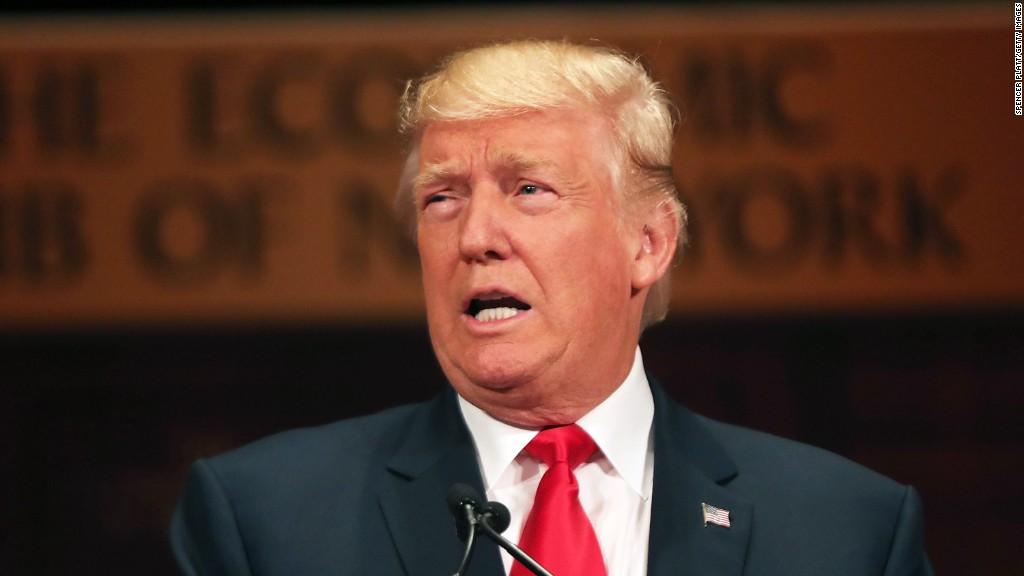
Donald Trump's agenda risks putting the U.S. economy in recession while Hillary Clinton's plans would have a modest positive impact, a new analysis shows.
Oxford Economics, a forecasting firm, put the two candidates' proposals side by side and analyzed them. Its conclusion: Clinton would be better for the economy.
If Trump implements all his policies -- however difficult that would be -- the economy stands to lose $1 trillion and 4 million jobs by the start of 2021.
Under Clinton, about 200,000 additional new jobs would be added by 2021 if she implements all her policies, compared to a scenario where no policies are changed. Economic growth, which has averaged 1% this year, would also be modest if all her proposals became law.
Trump's senior policy adviser, Peter Navarro, denounced Oxford's findings, calling it a "ludicrous" analysis.
"This is a narrow and myopic piece of political propaganda that ignores the tremendous growth-inducing benefits of the Trump economic plan," Navarro told CNNMoney.
Oxford says it has no political agenda, and that its economic models are unbiased and highly regarded. It had a team of economists working on the analysis.
Here is how Trump and Clinton stack up on the economy, according to Oxford Economics.
Trade
Trump: He has threatened tariffs on Mexico and China, which could provoke retaliation from those countries, laying the groundwork for a trade war, Oxford says.
U.S. businesses that sell in China and Mexico -- America's second and third largest trading partners -- would be negatively hurt.
Navarro argues that China and Mexico wouldn't retaliate with tariffs because they wouldn't be able to sell their goods in America. Both countries export much more to the U.S. than the U.S. exports to them.
Clinton: Despite her opposition to the Trans Pacific Partnership, her trade stance is largely in line with current policies of the Obama administration. Her trade policies wouldn't have a much different economic impact, Oxford estimates.
Related: Trump would cost U.S. $1 trillion
Taxes
Trump: On Thursday, Trump said he would reduce the number of tax brackets to three from seven.
Trump's tax cuts could be an initial boost to the economy, Oxford says, but eventually they would need to be met with reductions in government spending.
If government spending isn't reduced at the same pace as tax cuts, Trump's tax policy stands to hurt the economy because it would increase the federal deficit.
But Trump's other proposals actually increase government spending, whether it's on infrastructure, or building a wall on the Mexican border.
Navarro says Trump's tax cuts would be met by increased economic growth, taking away the need to lower government spending. The stimulus from lower taxes would add trillions of dollars to the economy over 10 years, he argues.
He reiterated that Mexico would pay for the wall, no the U.S. taxpayer.
Related: Here's what we import from Mexico
Clinton: Her proposals to raise taxes would be a drag on growth but could be counterbalanced by her spending on new roads, bridges and highways.
"The positive impact of increased government spending would offset the drag from higher taxes," says Greg Daco, chief U.S. economist at Oxford.
Oxford also notes that if Clinton were to implement her proposal for a $15 federal minimum wage, that would be a drag on job gains.
Without the minimum wage reform, Clinton adds roughly 800,000 more jobs to the economy than compared to the gains if no policies change. But with minimum wage reform, she only adds 200,000 more positions because employers would reduce future hiring and hours, Oxford forecasts.
Immigration
Trump: His promise to deport roughly 11 million undocumented immigrants would weigh down the U.S. economy, Oxford found.
The group estimates that Trump could only realistically deport 600,000 undocumented immigrants per year.
But deporting so many people would shrink the labor force and cut back on consumer spending, which is the engine behind much of the U.S. economy's growth.
Clinton: Her immigration plan to provide a path to citizenship for undocumented immigrants would have a positive effect: increasing the labor force at a time when it's shrinking because many Baby Boomers are retiring.
Economists note that legal workers tend to be more productive than undocumented workers. Right now, U.S. worker productivity is low and dragging down economic growth. More legalized citizens could help boost growth.
Related: The U.S. economy's biggest problem: the smartphone?
Public confidence
Trump: Americans of all stripes hate uncertainty. Whether it's decisions on buying a house, making a business decision or investing their money, Americans want to know the landscape ahead before opening up their wallet.
Oxford argues that Trump would create a "trial and error" presidency where he would implement a reform, then shift policy in six to 12 months.
"Businesses are going to retrench, investment is going to retrench because they're not going to know what the policy landscape will be 6 months ahead or 12 months ahead," says Daco.
Navarro says Trump's economic plan is clear: lower taxes, less regulation and trade deals that benefit Americans. Trump's proposal to lower corporate taxes will bring more, not less, business investment, he claims.
Clinton: She is one of the best-known commodities in politics. The expectation is that she would continue much of the policies of the Obama administration. The potential for the other party to control Congress would also likely create gridlock and that gives business owners and investors a clearer landscape, Oxford argues.


